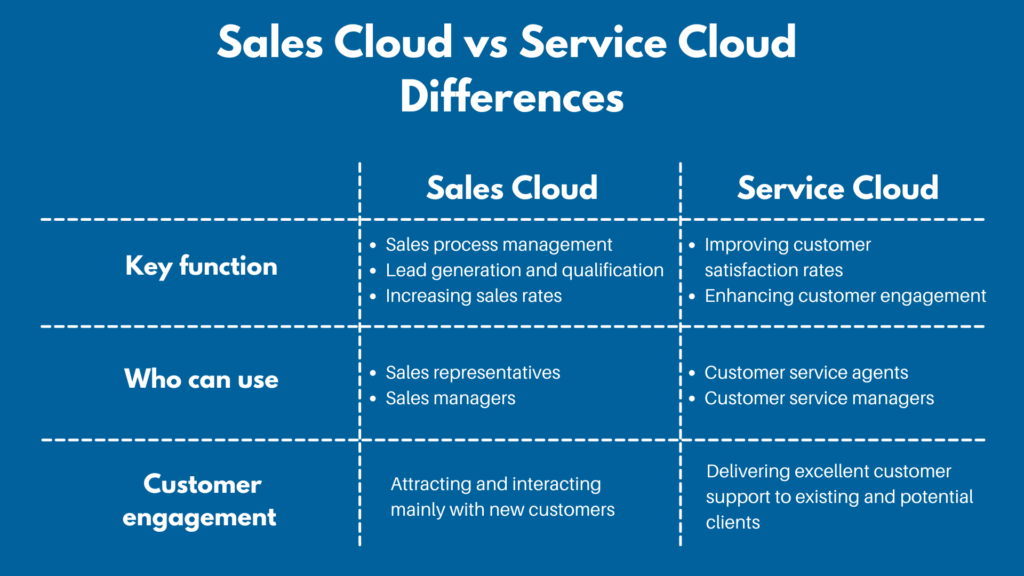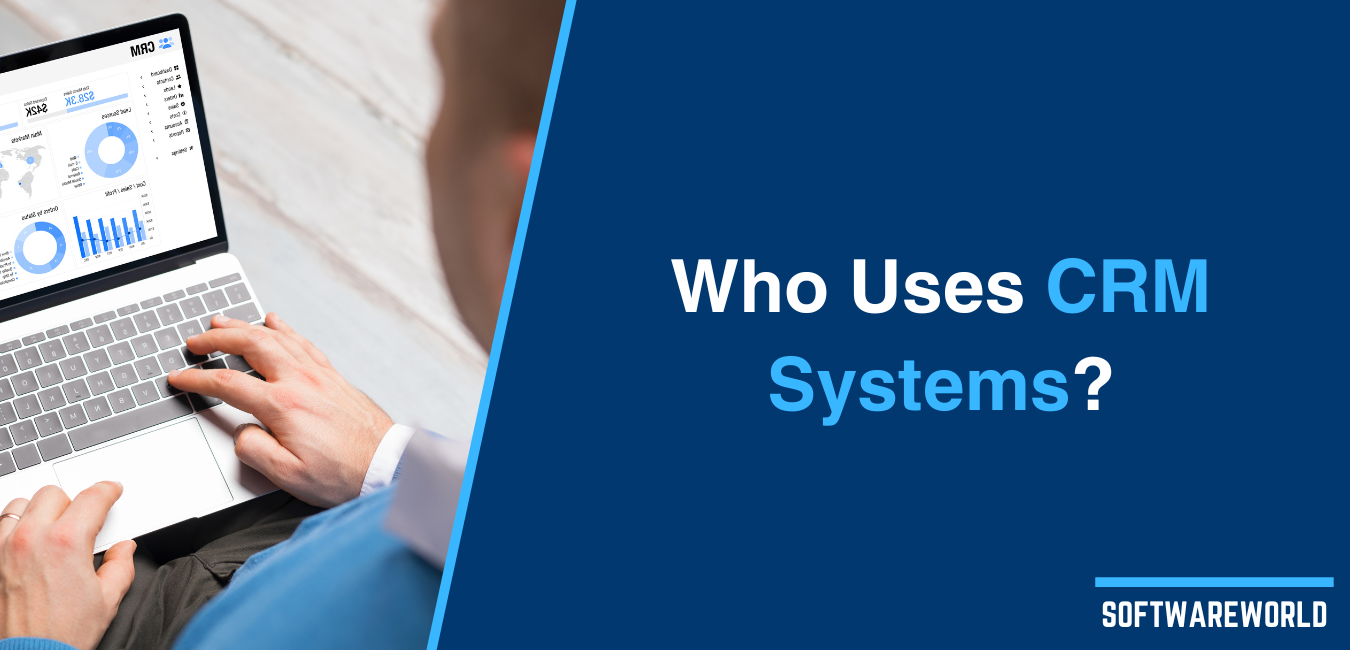Table of Contents
Salesforce has been known as one of the leading CRM and ERP solution providers for over the past two decades. The variety of tools offered by the company is impressive. Sometimes, business owners and managers find it difficult to choose one or several solutions to apply for their needs. In this article, we will tell you more about the two Salesforce tools that can get mixed up from time to time: Sales Cloud and Service Cloud. We will cover their main features, benefits, explain their differences, and will give you a clear understanding of their key functions to help you pick the right one for your business.
What is Salesforce Sales Cloud?
Sales Cloud is one of the key Salesforce products designed to help sales teams better manage, track, and analyze sales processes across the organization. This module is mainly used by sales managers and sales representatives to complete their day-to-day tasks and activities in a more efficient way.
From the sales representative perspective, Sales Cloud provides integration with numerous channels for communication with potential and existing customers. It also enables automation across repetitive and routine tasks, thus optimizing sales team workflows and time spent. Meanwhile, sales managers apply the Sales Cloud functionality to create robust sales strategies, evaluate sales rep performance, provide training for the entire sales department, thus increasing its productivity.
What is Salesforce Service Cloud?

Service Cloud is the Salesforce module aimed to help service teams increase their engagement with clients and deliver better customer experiences. With the help of its features, service teams can improve relationships with clients and increase customer satisfaction rates.
The main reason for customer support teams to use Service Cloud is an opportunity to serve customers faster without compromising the quality of customer service. Integration with the organization’s website, social media, and Salesforce knowledge base helps customer service agents better respond to customers’ requests and needs.
Comparing Sales Cloud and Service Cloud Features
Sales Cloud and Service Cloud are one of the core modules of the Salesforce CRM system. Although some features overlap in both solutions, there are certain functionalities that differ the Salesforce tools from one another.

Common features include:
-
-
Account management
-
Salesforce users can manage their accounts from a single dashboard. It is simple to use, navigate, and adjust in accordance with your employees’ needs.
-
-
Contact management
-
In-built contact management software allows adding, editing, and structuring customer contact information. It helps to schedule tasks, better organize contacts, pulls in social media data, thus optimizing workflows associated with customer engagement.
-
-
Case management
-
Case management extension helps both service and sales teams better respond to their customers’ needs. It allows creating cases, addressing them to the right specialists to get more accurate support and track their status within the platform.
-
-
Reporting system and analytics
-
Data is the power. Most of the reports in Salesforce are built automatically, but you can always customize them in accordance with your business needs. Based on data analysis, managers and executives can make critical data-driven decisions and adjust their key strategies to improve the overall business performance.
-
-
Automation
-
Time is one of the most important resources we have. To make sure your employees don’t waste their time on repetitive tasks, Salesforce introduces automation across numerous repetitive operations, thus streamlining and optimizing processes within the organization.
-
-
Customization
-
Customize platform functionality when needed. Salesforce allows organizations to exclude and add modules and features whether they want to expand or cut costs.
Let’s have a closer look at each platform’s functionality individually. These are only a few of the key features offered by Salesforce modules.
Sales Cloud Features
-
-
Opportunity management
-
This feature helps sales managers track their sales process all the way from the first call with the client to finalizing the deal. Schedule calls and send emails, add notes and create tasks to make sure you have all the information once you get back to each particular case.
-
-
Lead management
-
Lead management tool is a great way to show how your marketing activities impact your sales outcomes. Besides the possibility to track and qualify leads within a single dashboard, you can also manage marketing campaigns aimed to generate more leads and adjust them in accordance with your customers’ needs.
-
-
Email integration
-
Salesforce modules can be integrated with various email services such as Outlook or Gmail. It helps sales reps to manage their inbox and create deals and cases from a single dashboard, thus saving their time and boosting productivity.
-
-
Sales forecasting
-
This is one of the most important features of the module that actually makes a difference for future business results. Accurate reporting and analytics provide sales managers with real-time data on the current business performance. Based on this data, the head of sales can make critical decisions and take actions where it’s needed to help the business grow and prosper.
Service Cloud Features
-
-
Einstein intelligence
-
Einstein is the Salesforce artificial intelligence designed to cover one of the key CRM needs. In the case of Service Cloud, it represents a set of technologies aimed to help service teams serve their customers in a more efficient way. Einstein analyzes conversations between service team members and customers, delivers personalized recommendations, and speeds up the entire customer support process.
-
-
Knowledge base management
-
Salesforce knowledge base contains everything, your service team needs to provide accurate and relevant information to customers. From brochures and sales guides to articles and FAQs. You can search through the knowledge base during the conversation to find the answer or simply encourage customers to browse through your website’s particular section or blog to get more detailed information.
-
-
Computer-telephony integration
-
Making calls from a regular phone and putting notes afterwards on your computer doesn’t sound like good task management. That’s why Salesforce aims to make it easier for service teams to manage their calls with customers and introduces telephony integration. Now you can make and log calls, as well as check your customer’s profile to get more details directly from your dashboard.
-
-
Workforce management
-
Service Cloud provides managers with an opportunity to optimize their staff workflows and key processes to boost productivity and cover as many customers' needs in a shorter period of time as possible. Enable intelligent planning and provide regular training for your employees to improve their skills.
Difference between Sales Cloud and Service Cloud
Despite having a lot in common, these Salesforce modules are not the same. They mainly differ in their key functionality, target users, and ways of engagement with customers.

Does your business need both Salesforce tools?
Salesforce solutions aim to bring value to your business when used properly. Your organization can benefit from artificial intelligence, data-driven decision-making, and an extra level of agility. Besides, key Salesforce functionalities can be accessed 24/7 from anywhere through a mobile device, thus making its solutions flexible.
So do you need both Sales Cloud and Service Cloud? If your organization has both fully operating sales and service departments, both solutions will work for your business benefit. In other cases, it’s up to you to decide whether this investment is worth it and can bring you valuable results.
 Brad is the CEO of OMI with over two decades of experience in Software as a Service and managed service industries. Brad has previously created publications for the OMI blog, popular media resources, hosts his own business podcast, and regularly participates in numerous interviews sharing his ideas and the latest trends in business and customer relationship management.
Brad is the CEO of OMI with over two decades of experience in Software as a Service and managed service industries. Brad has previously created publications for the OMI blog, popular media resources, hosts his own business podcast, and regularly participates in numerous interviews sharing his ideas and the latest trends in business and customer relationship management.



